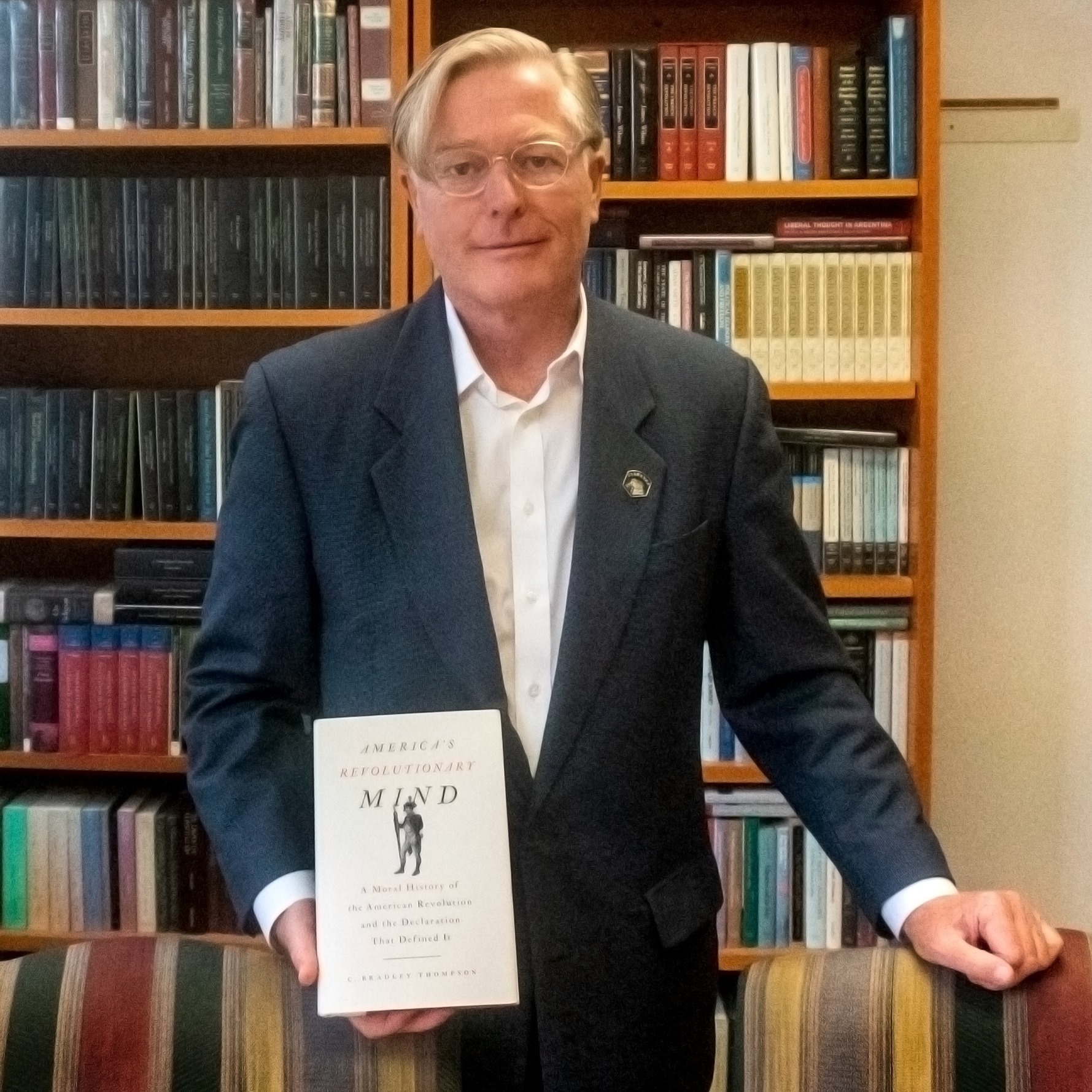风萧萧_Frank
以文会友Understanding Marxism: From Each According to His Ability
By C. Bradley Thompson
https://www.youtube.com/watch?v=qV27AGomwFA
About C. Bradley Thompson
The Redneck Intellectual
by | Dec 22, 2020 | Announcements

C. Bradley Thompson – author, professor and lecturer – has launched a new blog called The Redneck Intellectual.
Thompson is a Professor of Political Science at Clemson University, where he teaches political philosophy. He is also the Executive Director of the Clemson Institute for the Study Capitalism and the founder of the Lyceum Scholars Program.
The purpose of this blog is in Thompson’s own words: ” My goal is to rouse you from your dogmatic slumbers, to challenge you to think new thoughts, and to inspire you to live the best life possible.”
Subscribe to the blog here: https://cbradleythompson.substack.com/
Learn more about C. Bradley Thompson and follow him on social media here, here, and here.
Thompson is the author of four books:
America’s Revolutionary Mind: A Moral History of the American Revolution and the Declaration That Defined It
NEOCONSERVATISM: An Obituary for an Idea
Anti-Slavery Political Writings, 1833-1860
John Adams and the Spirit of Liberty
Understanding Marxism: From Each According to His Ability
https://www.youtube.com/watch?v=qV27AGomwFA
Private property, wage labor, competition, and profits — under Karl Marx's world view, these would have to go. Instead of self-interest, everybody would work for the benefit of everybody else. For many, this is a very seductive idea. Is this the dream we should aspire to? Or would it be a nightmare? C. Bradley Thomspon is the author of “The Redneck Intellectual” on Substack, and America’s Revolutionary Mind: A Moral History of the American Revolution and the Declaration that Defined It.
Script:
In a remarkably short period of time, the philosophy of Karl Marx changed the course of history.
At the height of its power, half the world fell under its dominion, kept there by a combination of fear, terror, and brute force.
Then suddenly in the late 1980’s, it imploded.
By all rights this should have been the end of Marxism. But it hasn’t turned out that way.
From environmentalism with its rejection of free markets to Critical Race Theory which sees white patriarchy as the source of all evil, you’ll find Marxism at its root. The leaders of Black Lives Matter, for example, openly acknowledge their devotion to Marxist ideology.
How do we explain this fascination for something that has so utterly failed everywhere it’s been put into practice?
We can find answers in one of Marx’s most enduring epigrams.
“From Each According to his Ability, to Each According to his Needs.”
Marx was a poor economist, but a talented journalist, the only actual job he ever had. He knew how to turn a phrase. But what does this slogan mean? According to what ability? According to what need? And who determines anyone’s ability or anyone’s need?
Marx never bothered to answer these obvious questions. He had much bigger things on his mind: nothing less than the creation of an entirely new kind of world for an entirely new kind of human being.
Marx believed that by altering man’s economic and political institutions, he could alter — or even better — rewire the human brain; he could conjure a new consciousness that would replace the old “false” one. This new man would be less selfish and acquisitive and more altruistic and communal. In short, he would be a superior type of man.
Of course, this new man could only reach this goal if he wasn’t preoccupied with having to earn money. According to Marx, money and the pursuit of it ruined everything. Marx hated money – maybe because he never found a way to make it. Getting rid of it was central to his world view. Once a person’s subsistence — one’s daily bread — was distributed on the basis of need rather than greed, man’s natural communal affections — long suppressed by his capitalist overlords — would be renewed.
This is Marx channeling the 18th century French social thinker Jean Jacques Rousseau, one of the few people Marx admired. According to Rousseau, this is what you must do if you want to create a new society.
“He who dares to undertake the making of a people’s institutions must feel himself capable of changing…human nature, of transforming each individual, who by himself is a complete and solitary whole, into a part of a larger whole, from which . . . the individual receives his life and his being…”
Understand this and you understand not only a key feature of Marxist thought, but the dark history of the twentieth century.
Marx took Rousseau literally: human nature had to be returned to its allegedly pure, selfless state before capitalism, with its Enlightenment and Judeo-Christian values, “corrupted” him.
But creating this “new man” would be a formidable task. Marx anticipated that many would object, especially the owners and managers that had a large stake in the capitalist system. Friendly persuasion wasn’t going to get the job done. Only the ruthless application of State power would be up to the task.
Marx was all for it.
Private property, wage labor, competition, and profits — these would have to go. The State, now run by the workers themselves — The Dictatorship of the Proletariat, as Marx called it — would control production and pricing. It would wisely manage the economy: from each according to his ability, to each according to his needs.
And imagine how wonderful it would be — no more ego, no more self-interest; instead, everybody working for the benefit of everybody else. Peace. Love. Harmony.
For the complete script, visit: https://www.prageru.com/video/underst...
认识马克思主义:各尽所能
https://www.youtube.com/watch?v=qV27AGomwFA
私有财产、雇佣劳动、竞争和利润——在卡尔马克思的世界观下,这些都必须消失。每个人都不会为自己的利益而工作,而是为其他人的利益而工作。对许多人来说,这是一个非常诱人的想法。这是我们应该追求的梦想吗?还是会是一场噩梦? C. Bradley Thomspon 是 Substack 上的“乡巴佬知识分子”和美国革命思想:美国革命的道德史和定义它的宣言的作者。
脚本:
在极短的时间内,卡尔·马克思的哲学改变了历史进程。
在它权力的顶峰时期,半个世界都落入了它的统治之下,被恐惧、恐惧和蛮力相结合。
然后在 1980 年代后期突然爆发。
无论如何,这应该是马克思主义的终结。但事实并非如此。
从拒绝自由市场的环保主义到将白人父权制视为万恶之源的批判种族理论,你会发现马克思主义的根源。例如,Black Lives Matter 的领导人公开承认他们对马克思主义意识形态的忠诚。
我们如何解释这种对在任何地方都完全失败的东西的迷恋?
我们可以在马克思最经久不衰的警句之一中找到答案。
“各尽所能,各取所需。”
马克思是一个贫穷的经济学家,但却是一个才华横溢的记者,是他唯一一份真正的工作。他知道如何转词。但是这个口号是什么意思?根据什么能力?根据什么需要?谁决定了任何人的能力或任何人的需求?
马克思从不费心回答这些显而易见的问题。他有更宏大的事情在想:无非是为一个全新的人类创造一个全新的世界。
马克思相信,通过改变人类的经济和政治制度,他可以改变——甚至更好地——重新连接人类大脑。他可以召唤出一种新的意识来取代旧的“虚假”意识。这个新人将不那么自私和贪婪,而是更加利他和社区。简而言之,他将是一个优秀的人。
当然,这个新人只有在不忙于赚钱的情况下才能达到这个目标。根据马克思的说法,金钱和对金钱的追求毁了一切。马克思讨厌钱——也许是因为他从来没有找到赚钱的方法。摆脱它是他世界观的核心。一旦一个人的生计——一个人的日常面包——根据需要而不是贪婪来分配,人类长期以来被资本主义霸主压制的自然的公共感情就会得到更新。
这是马克思对 18 世纪法国社会思想家让·雅克·卢梭的引导,他是马克思钦佩的少数人之一。卢梭认为,如果你想创建一个新的社会,这是你必须做的。
“敢于建立人民制度的人必须感到自己有能力改变……人性,将每个单独的个体转变为一个更大的整体的一部分,从中…… . .个人接受他的生命和他的存在……”
理解这一点,你不仅理解了马克思主义思想的一个关键特征,而且理解了二十世纪的黑暗历史。
马克思从字面上理解了卢梭:在资本主义以其启蒙运动和犹太-基督教价值观“腐蚀”他之前,人性必须回到其所谓的纯粹、无私的状态。
但创造这个“新人”将是一项艰巨的任务。马克思预计许多人会反对,尤其是在资本主义制度中拥有大量股份的所有者和管理者。友好的劝说不会完成工作。只有无情地运用国家权力才能胜任这项任务。
马克思完全赞成。
私有财产、雇佣劳动、竞争和利润——这些都必须消失。现在由工人自己管理的国家——马克思称之为无产阶级专政——将控制生产和定价。它将明智地管理经济:各尽所能,各取所需。
想象一下这将是多么美妙——不再自负,不再自私;相反,每个人都在为其他人的利益而工作。和平。爱。和谐。




